Call the Midwife: Season Two Blu-ray Movie
HomeCall the Midwife: Season Two Blu-ray Movie 
BBC | 2013 | 555 min | Not rated | Jun 18, 2013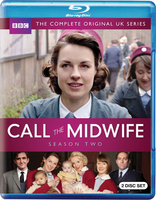
Movie rating
7.6 | / 10 |
Blu-ray rating
| Users | 0.0 | |
| Reviewer | 4.0 | |
| Overall | 4.0 |
Overview
Call the Midwife: Season Two (2013)
The second season offers more stories from the memoirs of a midwife and nurse who worked in the East End of London in the 1950s. Includes the 2012 Christmas Special.
Starring: Jessica Raine, Pam Ferris, Helen George, Laura Main, Judy ParfittNarrator: Vanessa Redgrave
Director: Philippa Lowthorpe, Juliet May, China Moo-Young, Minkie Spiro, Jamie Payne
| Period | Uncertain |
| Drama | Uncertain |
Specifications
Video
Video codec: MPEG-4 AVC
Video resolution: 1080p
Aspect ratio: 1.78:1
Original aspect ratio: 1.78:1
Audio
English: Dolby Digital 2.0 (192 kbps)
Subtitles
English SDH
Discs
50GB Blu-ray Disc
Two-disc set (2 BDs)
Playback
Region A, B (C untested)
Review
Rating summary
| Movie | 4.5 | |
| Video | 4.0 | |
| Audio | 3.0 | |
| Extras | 1.5 | |
| Overall | 4.0 |
Call the Midwife: Season Two Blu-ray Movie Review
Still Answering the Call
Reviewed by Michael Reuben July 16, 2013Spoiler alert: The following assumes that the reader is familiar with previous episodes of Call the Midwife. Readers new to the series should consult the review of Season One for a spoiler-free introduction. When the first season of Call the Midwife was shown in 2012, it generated higher ratings for the BBC than any new series since 2001. The response to the broadcasts on PBS was equally favorable. No doubt part of the reason was the sheer novelty of the stories, which is what prompted Jennifer Worth to write the memoirs on which the series was based. Though Midwife depicted events within living memory, it seemed like another world, given the pace of medical advances and the thorough integration of the National Health Service into British life. The critic for The Times called it one of the most radical dramas ever broadcast, because it demonstrated "how unbelievably terrifying, dreary and vile it was to be a working-class woman 60 years ago". Certainly that is one defining aspect of the series, but there's much more to it. As co-star Pam Ferris observes in the excellent documentary included with Season Two, Call the Midwife is a show about extremes. The love lavished on newborn babies contrasts sharply with the frequent cruelty of the circumstances surrounding their birth. The nuns and nurses ministering to the women of the impoverished Poplar neighborhood deal with blood, guts and trauma, then return to Nonnatus House for a life of spiritual devotion and idealistic service. In their off-hours, the midwives are young women who gossip, giggle and mist up at the cinema, but in their daily work they make life-and-death decisions and boss around men who, in other circumstances, they might be too shy even to address. (For the most part, the men behave as instructed.) From one moment to the next, you never know whether Midwife will deliver unexpected comedy or dire drama (and sometimes both at once).
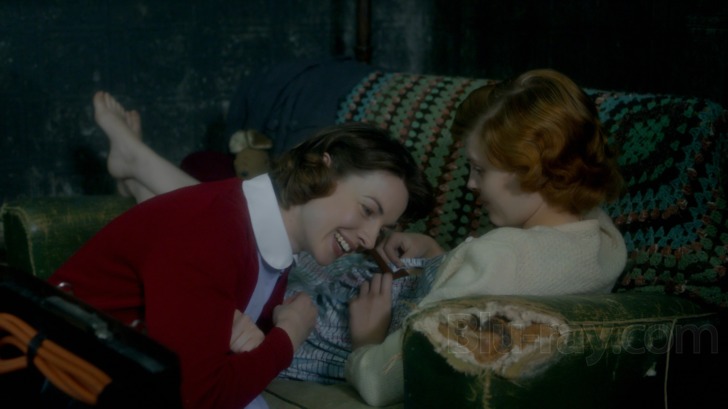
Season Two was preceded by a Christmas Special broadcast on Christmas Day in the U.K. and about a week later in the U.S. (depending on the local PBS schedule). The special served as a bridge to the second season by catching up with the staff of Nonnatus House some months after the wedding that concluded Season One. The former Chummy Brown (Miranda Hart) is now Chummy Noakes, blissfully ensconced in the flat of her new husband, PC Peter Noakes (Ben Caplan), the faithful constable who patrols the streets of Poplar in the East End, keeping a special eye on Nonnatus House. At the moment, Chummy is devoting all her free time to helping handyman Fred (Cliff Parisi) drill the local troop of Wolf Cubs for the annual Christmas Pageant. Under Chummy's direction, it will be bigger and better than ever. So much for the holiday's lighter side. Its dark undertones are represented by an abandoned newborn that Cynthia Miller (Bryony Hannah) and Trixie Franklin (Helen George) find on the steps of Nonnatus House. The mother, a desperate local teen, is revealed when she collapses from post-natal complications. Meanwhile, Jenny Lee (Jessica Raine) becomes involved with an elderly beggar, Mrs. Jenkins (Sheila Reid), with a strange attraction to babies, who is thought to be mad by all in the neighborhood, except for Sister Evangelina (Pam Ferris), who knows something of her history. It turns out that Mrs. Jenkins suffers both from terrible medical neglect and a personal history so horrific that Jenny can scarcely believe it when she begins to research it. (It involves the old workhouse system, and everything is neatly documented.) Under the guidance of Sisters Evangelina and Julienne (Jenny Agutter), Jenny attempts to provide the old lady some measure of peace. In a modest version of a Christmas miracle, she succeeds. When Season Two began its regular episodes on January 20, 2013, Jenny was celebrating her first birthday in Nonnatus House, and the occasion was appropriate for a season in which the sense of time passing is a recurring motif. Major advances in medical practice begin to appear, starting with the nitrous oxide that heralds a new era in managing the pain of childbirth. When word of the miracle treatment spreads among the women of Poplar, Dr. Turner (Stephen McGann) is nearly run off his feet carting the gas tanks from one delivery to the next. Some months later, Dr. Turner will be instrumental in persuading the London authorities to prioritize Poplar for a visit from one of the new mobile chest X-ray vans designed to provide early detection of tuberculosis, now that it is a treatable disease. With the nurses of Nonnatus House spreading the word, a huge crowd awaits the newfangled vehicle with its imposing apparatus, and much of Poplar gets screened. But the day's triumph is undercut by the discovery that one of the House's own residents has tested positive for TB. One medical advance hasn't arrived but is in progress in faraway labs, as noted by the elder Jenny, who still narrates every episode in the soothingly authoritative voice of Vanessa Redgrave. The birth control pill has yet to be perfected, and with other forms of contraception not yet covered by National Health, women without means are still at nature's mercy. One of Jenny's patients, Nora Harding (Sharon Small), is beside herself when she becomes pregnant with her ninth child, because she and her husband, Bill (Mark Flitton), can barely support the eight they already have. Against all of Jenny's urging, Nora seeks help from Mrs. Pritchard (Allison Newman), the local back street abortionist, with dire consequences. It is the only occasion when we see Jenny instinctively recoil from a patient, prompting a reproach from Sister Julienne. Do you think, says the worldly nun, that this is the first time we have had to deal with this? All of Jenny's fellow midwives face new challenges in Season Two. Chummy and her new husband set off on an adventure that takes them far away from Nonnatus House for an extended period. (Fans need not fear; she returns after a few episodes with a typically memorable entrance.) Cynthia suffers a crisis of confidence after a delivery that seemed perfectly normal goes horribly wrong. The support of all her colleagues is required to get her back into service. Trixie's mettle is tested when she must unexpectedly take over a case from Sister Evangelina on an unusual call to a Swedish ship anchored in the harbor, where a woman has gone into labor and Trixie has to stare down an entire crew of sailors who don't speak English. On a different front, the vivacious blonde, who fancies herself a match for any man, finds herself crushingly outmaneuvered when she attempts to persuade a handsome TV personality, Clifford Raines (Tristan Gemmill), to be a celebrity judge at the annual Nonnatus House festival. Nonnatus House gains one new resident in Season Two. Her name is Jane Sutton (Dorothy Atkinson), her official position is medical orderly, and she arrives to assist in Chummy's absence. But despite her shy demeanor, Jane quickly becomes an indispensable part of the unique world that exists with this strange building that is equal parts religious retreat, sorority house, fire station and, thanks to the increasingly bizarre behavior of retired midwife Sister Monica Joan (Judy Parfitt), lunatic asylum. Sister Monica Joan's deteriorating condition begins to interfere with the work of the midwives, when she starts answering the telephone and telling the anguished callers needing urgent care: "We're closed." Jenny's former boyfriend, Jimmy Wilson (George Rainsford), reappears in Season Two, now considerably more mature and gainfully employed by the city's council. For a moment, Jenny has second thoughts about having turned him away, but there are too many practical obstacles. More serious concerns arise when Jenny spends a week "seconded" to a London surgical hospital that is short-staffed. She spots problems with the hospital's personnel, which acquire special urgency when Jimmy is admitted in need of treatment. Of all the continuing stories that wind through Season Two, the longest and most involved is that of young Sister Bernadette, who, appropriately enough, begins the season by getting new glasses so that she can see her sewing more clearly. Sister Bernadette has been seeing other things differently as well, and her altered perception will lead her to question her life's path. By the end of the season, she makes momentous decisions.
Call the Midwife: Season Two Blu-ray Movie, Video Quality 
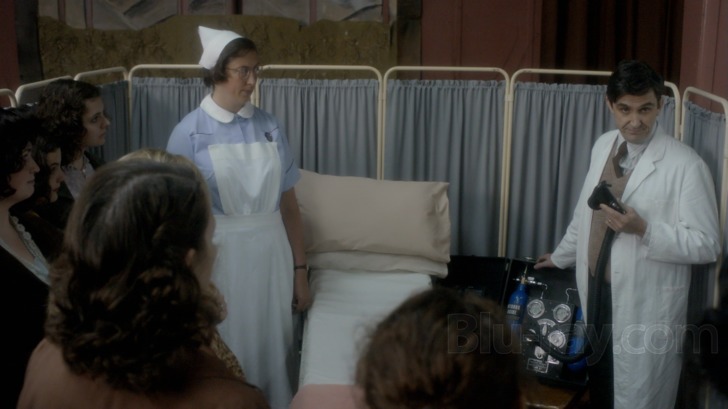
Like Acorn Media, BBC Home Video appears to be embracing 1080p formatting for its digitally acquired series. Season One of Call the Midwife received 1080i treatment, but Season Two is presented at 1080p with AVC encoding. It's a good thing, too, because Season Two had eight episodes, plus the extended Christmas Special, as opposed to Season One's six episodes, and BBC has refused to spring for a third disc. Therefore, Season Two arrives with an additional 195 minutes (approximately) crammed onto its two BD-50s. As I have discussed elsewhere, 1080i produces unpredictable, and often unfortunate, results when subjected to the additional compression required to achieve such results. Fortunately, 1080p is more flexible, and there is no diminution in quality here. The image throughout Season Two is comparable to that presented on the Season One Blu-rays. The soft and slightly faded period look established by Chris Seager, and continued by several DPs who picked up where he left off, remains consistent throughout, with deep blacks that are especially valuable in some of the darker interiors of the East End or in the occasional nighttime excursion, like the intimidating trip to the Swedish ship at anchor that Trixie and Sister Evangelina make in a small rowboat. An occasional bright hue leaps off the screen for a startling effect, such as the yellow flowers that Jenny picks from the Nonnatus House garden to cheer up a patient, or the green sweater worn by a patient with a "big" personality (who gives Jenny pause for other reasons). The annual festival celebrated in Episode 5 is a particularly colorful occasion, which is then interrupted by a medical emergency. Detail is impressive throughout, allowing full appreciation of the production team's recreation of Fifties London in the East End, right down to the cobblestone streets (a challenge for bike riding, according to actress Jessica Raine). It also brings the viewer closer to the physical realities of birth than some may find comfortable (using a combination of prosthetics and live infants), although the camera angles and shot durations are chosen with care to remain tasteful and non-exploitative. Nevertheless, birth is not a neat affair, and a series about midwifery wouldn't be truthful if it didn't show the messy side of the work. The Blu-ray image reflects it in all its physical immediacy.
Call the Midwife: Season Two Blu-ray Movie, Audio Quality 
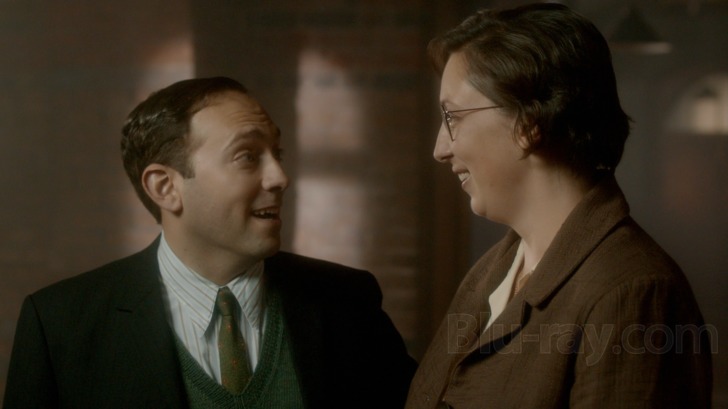
Probably in an effort to conserve space, BBC Home Video has dropped the lossless PCM stereo track included with Season One and switched to Dolby Digital. Now, I am not a lossless purist, but in this instance an unfortunate decision was made to limit the DD 2.0 track to the anemic DVD-standard bitrate of 192 kbps, which was a reasonable compromise for DVD's limited bandwidth and digital real estate but makes no sense on Blu-ray. The rate should have been at least 256 or, preferably, 448 kbps. Despite Dolby's claims, a bitrate of 192 kbps has never been fully "transparent" to the master recording, and the degradation in quality registers in small but telling ways on Season Two of Call the Midwife. First and most importantly, the dialogue is not always as clear as it was on the Season One Blu-rays. Heavy East End accents, speakers who overlap one another and ends of lines that are clipped by the speaker's exit are often difficult to make out. One can consult the subtitles, but I don't recall ever having to do so in Season One. I have a practiced ear for East End intonations and slang (which is used sparingly). The fact that I needed subtitles on multiple occasions with this set indicates either a change in the mix—doubtful, given the continuity of the creative team and the consistency of all the show's other elements—or a less accurate reproduction. Here's hoping that BBC Home Video reconsiders its approach to space saving and either increases the bitrate or else embraces a space-saving lossless format like DTS-HD Master Audio. The remainder of the track does not suffer so obviously from the change in sound encoding. Call the Midwife does not try to create an immersive surround field from its two channels. The essential sound effects are accurately reproduced, and Peter Salem's original score, including multiple variations on the series' memorable theme, plays with sufficient fidelity to accomplish its job. Even more than Season One, Season Two uses period-specific pop tunes to wonderful effect (for example, Dean Martin's cover of "Volare", which was released in 1958).
Call the Midwife: Season Two Blu-ray Movie, Special Features and Extras 
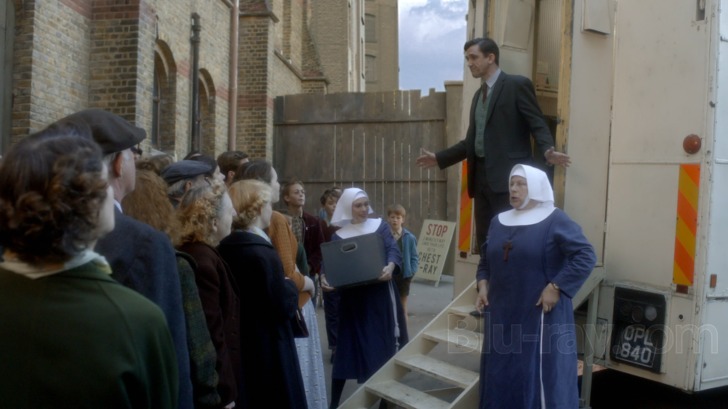
- Midwifery, Adaptation & Detail (disc 2) (1080p; 1.78:1; 30:01): Three times the length of Season One's featurette, this documentary focuses less on the cast and more on the creative team responsible for adapting Call the Midwife as a drama for television. A major participant is technical advisor Terri Coates, whose article on midwifery inspired Jennifer Worth to write her memoirs and who served as consultant during the writing. Series creator Heidi Thomas and executive producer Pippa Harris are also interviewed, as they describe the transition from page to screen. The cast pitches in as well.
- Trailers: At startup, each of the two discs plays trailers that can be skipped with the chapter forward button and are not available once the disc loads. Disc 1 plays trailers for the 2011 BBC adaptation of Women in Love and BBC America. Disc 2 plays a trailer for Africa.
Call the Midwife: Season Two Blu-ray Movie, Overall Score and Recommendation 
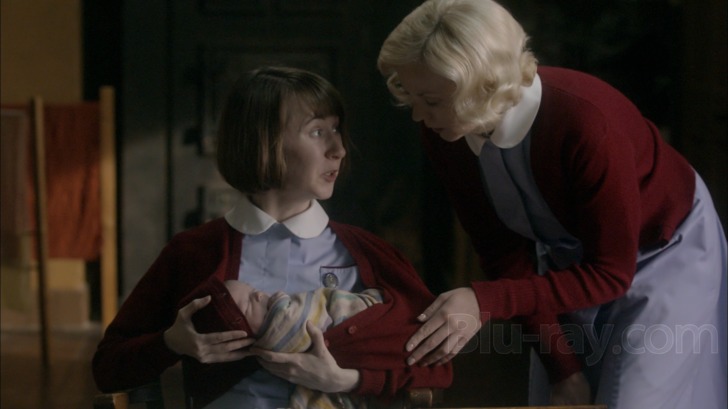
By the conclusion of Season Two, Call the Midwife had come to the end of Jennifer Worth's memoirs about her life as a midwife, but the public remains eager to hear more. Series creator Heidi Thomas has said that she received Worth's permission, before her death in 2011, to write episodes based on original stories, and there is probably no shortage of historically accurate material that has become available, because Worth's example has inspired her contemporaries to share their stories. Season Three, which will also be introduced by a Christmas Special, is to be set in 1959 and will deal with a sense of impending change. Indeed, Season Two itself concludes with a pleasing sense of closure. Where the series opened with an inexperienced Jenny Lee arriving for her first day at Nonnatus House on a bicycle, Season Two concludes with the fully qualified midwife and nurse riding away from it on a motorized bike—and she isn't alone. Highly recommended.
Other editions
Call the Midwife: Other Seasons

Call the Midwife: Season One
2012

Call the Midwife: Season Three
2014

Call the Midwife: Season Four
2015

Call the Midwife: Season Five
2016

Call the Midwife: Season Six
2017

Call the Midwife: Season Seven
2017
Similar titles
Similar titles you might also like
(Still not reliable for this title)

Won't Back Down
2012

Extraordinary Measures
2010

The Hundred-Foot Journey
2014

One Night with the King
2006

The Help
2011

October Baby
2011

The Ultimate Gift
2006

Runnin' from My Roots
2018

The Secret Garden
1993

Downton Abbey: A New Era
Collector's Edition
2022

Miss Potter
2006

Same Kind of Different as Me
2017

Dolly Parton's Coat of Many Colors
Warner Archive Collection
2015

Anne of Green Gables
30th Anniversary Edition
1985

The Deep End of the Ocean
1999

My Sister's Keeper
2009

Thomas Kinkade's Christmas Cottage
2008

Mr. Holland's Opus
1995

Akeelah and the Bee
2006

War Room
2015